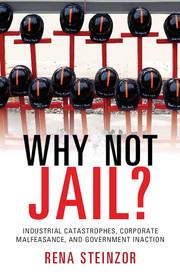Part Two - The Lessons of Catastrophe
Published online by Cambridge University Press: 05 December 2014
Summary
“Accidents” and Institutional Failure
The gradual demise of the regulatory system has left major manufacturing sectors adrift. Some operate without any meaningful regulatory oversight. Others are blanketed with detailed regulatory requirements but, on the rare occasions when inspectors show up to check compliance, enforcement actions are erratic and unpredictable and penalties are relatively low. These circumstances provide the owners and operators of plants and production sites with strong incentives to avoid substantial investments in upfront compliance costs, especially safety and pollution control equipment. Instead, they consciously take the risk of waiting to see if they will be caught. Admittedly, that outcome would be unpleasant, but it is also one that seems increasingly unlikely. Compounding the challenge of motivating compliance is the reality that the national political environment is dominated by angry allegations that overregulation is killing the nation’s economy. The spectacle of Obama administration political appointees appearing before disdainful House Republicans further suggests that companies may self-regulate as they see fit.
- Type
- Chapter
- Information
- Why Not Jail?Industrial Catastrophes, Corporate Malfeasance, and Government Inaction, pp. 95 - 104Publisher: Cambridge University PressPrint publication year: 2014

